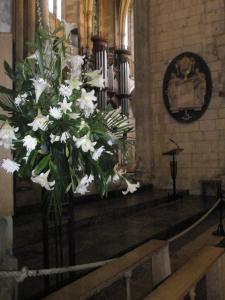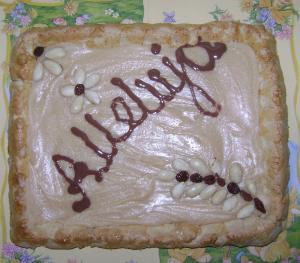 I have not been able to preach an Easter sermon for many years; after all, not many preachers will yield their pulpit to an outsider on that day of all days. Or if she does, I shudder to think what her congregation might think! I was last able to preach on an Easter Sunday some 22 years ago when a pastor decided to leave his church on Palm Sunday, leaving interim me to fill in for a couple of months. And of course one of the Sundays was Easter. I quite easily remember the occasion. Some 2000 people crowded the huge sanctuary at the 11:00AM service, and I had a grand time sharing the story of Mark’s gospel of the day. I have always loved Mark’s account of the resurrection, since it is filled with surprise and terror and finally throws the whole business back in the faces of us moderns. After all, Mark says, if the women left the tomb in horror, and “said nothing to anyone,” someone has to tell the world about this extraordinary new reality, and that someone is us! I just love that, and the story told works its magic still after two millennia.
I have not been able to preach an Easter sermon for many years; after all, not many preachers will yield their pulpit to an outsider on that day of all days. Or if she does, I shudder to think what her congregation might think! I was last able to preach on an Easter Sunday some 22 years ago when a pastor decided to leave his church on Palm Sunday, leaving interim me to fill in for a couple of months. And of course one of the Sundays was Easter. I quite easily remember the occasion. Some 2000 people crowded the huge sanctuary at the 11:00AM service, and I had a grand time sharing the story of Mark’s gospel of the day. I have always loved Mark’s account of the resurrection, since it is filled with surprise and terror and finally throws the whole business back in the faces of us moderns. After all, Mark says, if the women left the tomb in horror, and “said nothing to anyone,” someone has to tell the world about this extraordinary new reality, and that someone is us! I just love that, and the story told works its magic still after two millennia.
But the question is: just what is that new reality? Does Easter require us to suspend all rationality and simply believe that Jesus of Nazareth, unlike all other human beings who have ever lived in this world, in fact and in the flesh rose from his grave and now lives eternally with God? The church has long demanded that of us, suggesting that if we do not believe such a magic act, we will not join the risen Jesus in heaven after we die. In other words, his resurrection paves the way for our resurrection, and unless we believe that he is risen, our hope for eternal life is dashed.
I admit that I have never found any of this persuasive in the least. I have never bought the notion that Jesus was actually resurrected from the dead, and have never accepted that I can only be assured of an eternity with God if I did accept the tale literally and historically. I never have and cannot now do so either. This account is, rather like the parting of the waters at the Sea of Reeds in the book of Exodus and the gift of the Torah at the sacred mountain, the stuff of myth and legend, stories to live by, not events to be proved by archaeology, by historical research. The tale of the women at the tomb, the overwhelmed guards a la Matthew, the terrorized women according to Mark, the mysterious gardener in John’s retelling, are all rich narratives designed to prod us into thinking afresh about our own ongoing lives of faith. Rudolf Bultmann’s rather pretentious pronouncement that at Easter “Jesus was raised into the kerygma,” is for me not far wrong. The story of Jesus’ resurrection has indeed become the heart of the teaching (the kerygma) of the church, and has served as a touchstone for those who would be followers of the Way.
But we cannot fall back on some older manner of appropriating this new reality, this conviction that life in the end conquers death; death is not the final word of what it means to be a human being and the ancient story proclaims that once again. Our mortal lives are not merely snuffed out after 50, 60, 70, 80, or 100 years, and forgotten forever. In God, and in Jesus, we humans can find a larger purpose, a richer significance, a more important place in the ongoing life of the cosmos. Jesus has shown to us a better way to live, and a more astonishing way to die on behalf of the world. In the story of his life, death, and resurrection our lives are offered a portrait of full life and full death and a gateway to a larger life in God.
I have long loved the way that Frederick Buechner’s “Godric” puts it as he dips his 100 year old shriveled body in the River Wear: “All the death there is, set next to life, would scarcely fill a cup.” And that is the significance of the day of resurrection as it is portrayed in each of the New Testament gospels. Death is quite real, and a part of the life of every human, but its aria does not conclude the opera. It is life that sings the final strains, and that life in a deeply and amazingly rich mystery goes on in the life of God and the cosmos. I think Paul would approve old Godric’s words since he says, “O grave, where is your victory; O death where is your sting?” Death, he says, is swallowed up in victory, and the tale of Jesus’s last day on the earth makes that truth plain.
So then what do we proclaim on Easter Sunday? Death never has the final say, no matter how triumphant he appears to be, no matter how shattered he leaves those of us who remain alive after death has ravaged those we love and desperately miss. Death simply does not win! Like Egyptian Osiris and Babylonian Tammuz and Greek Ceres, life has a way of persisting, of thriving, of having its final say. Mark’s terrorized women were struck mute by the announcement that Jesus had been raised by the power of God, and so we must again lift our meager voices and proclaim as loudly and forcefully as we can that Jesus is risen, a reality that once again proclaims that “all the death there is, set next to life, would scarcely fill a cup!” Thanks be to God! (Cue the Hallelujah Chorus).
Images from Wikimedia Commons











